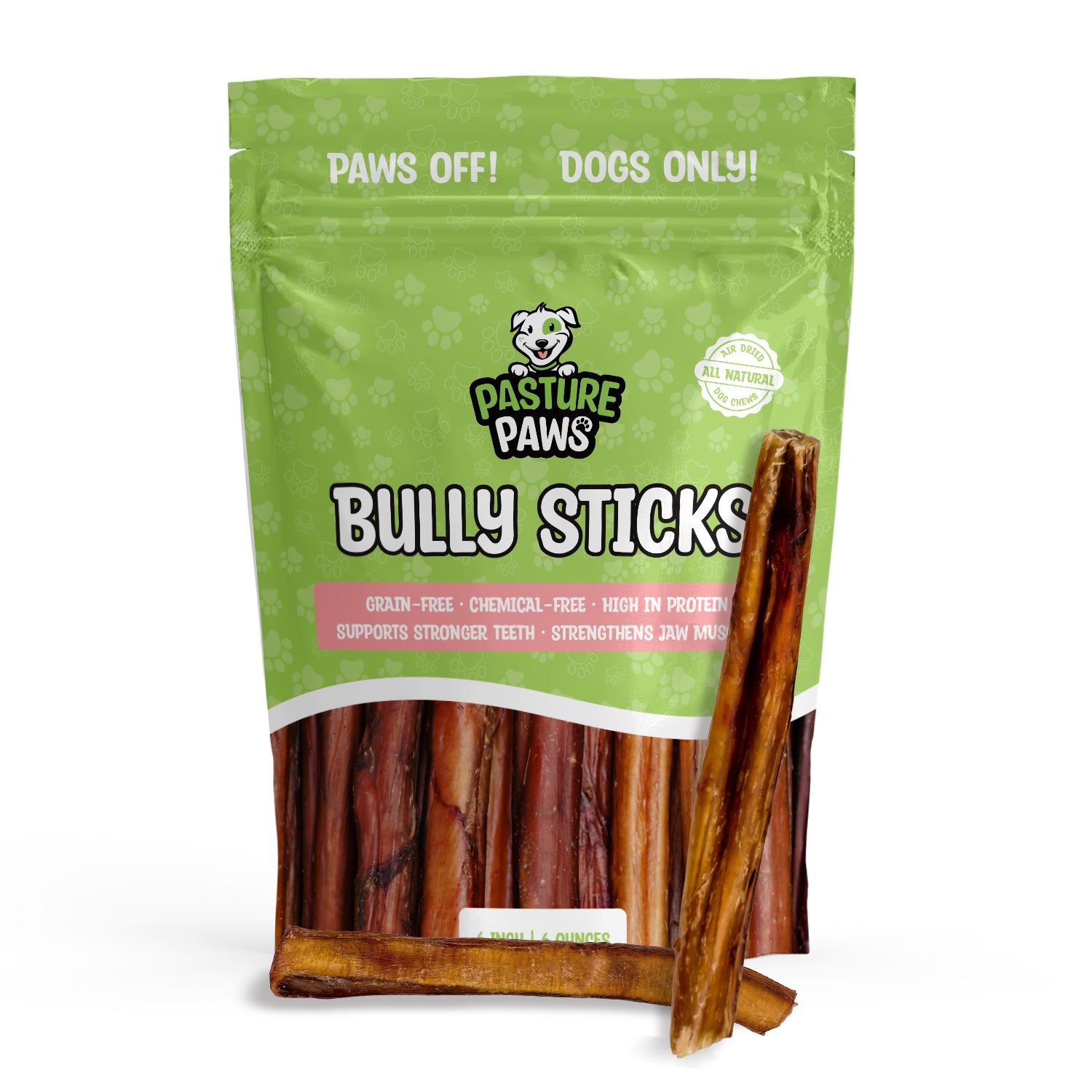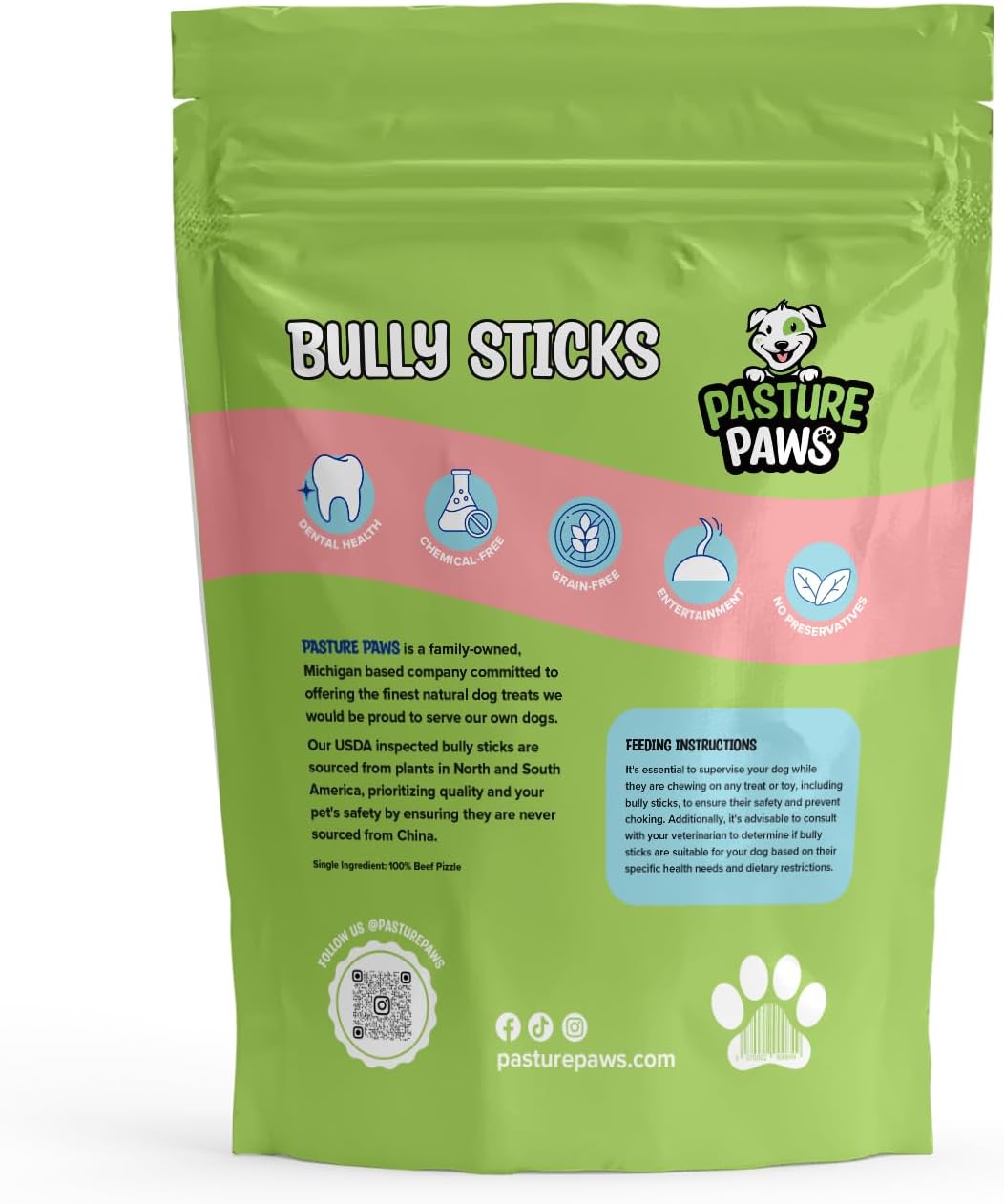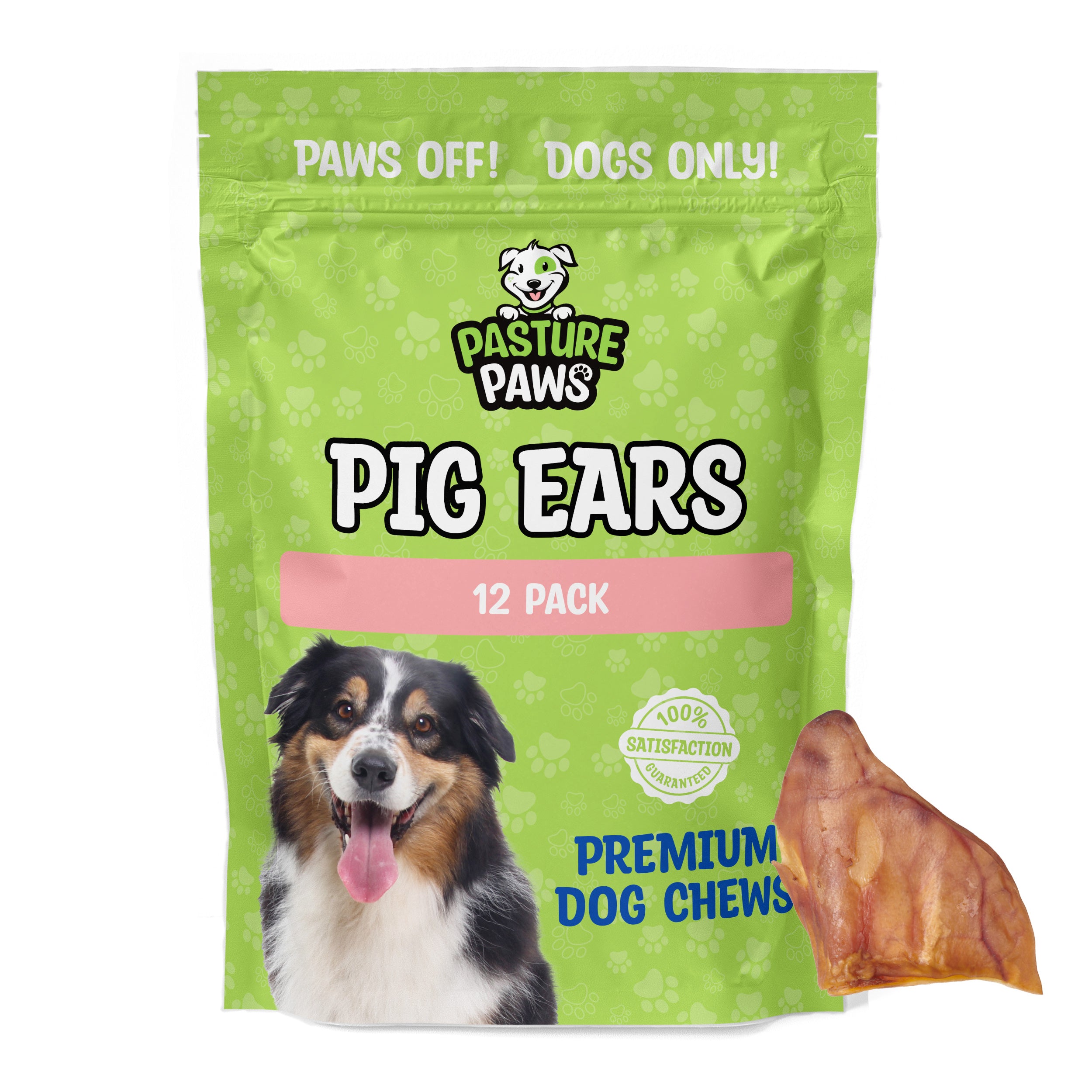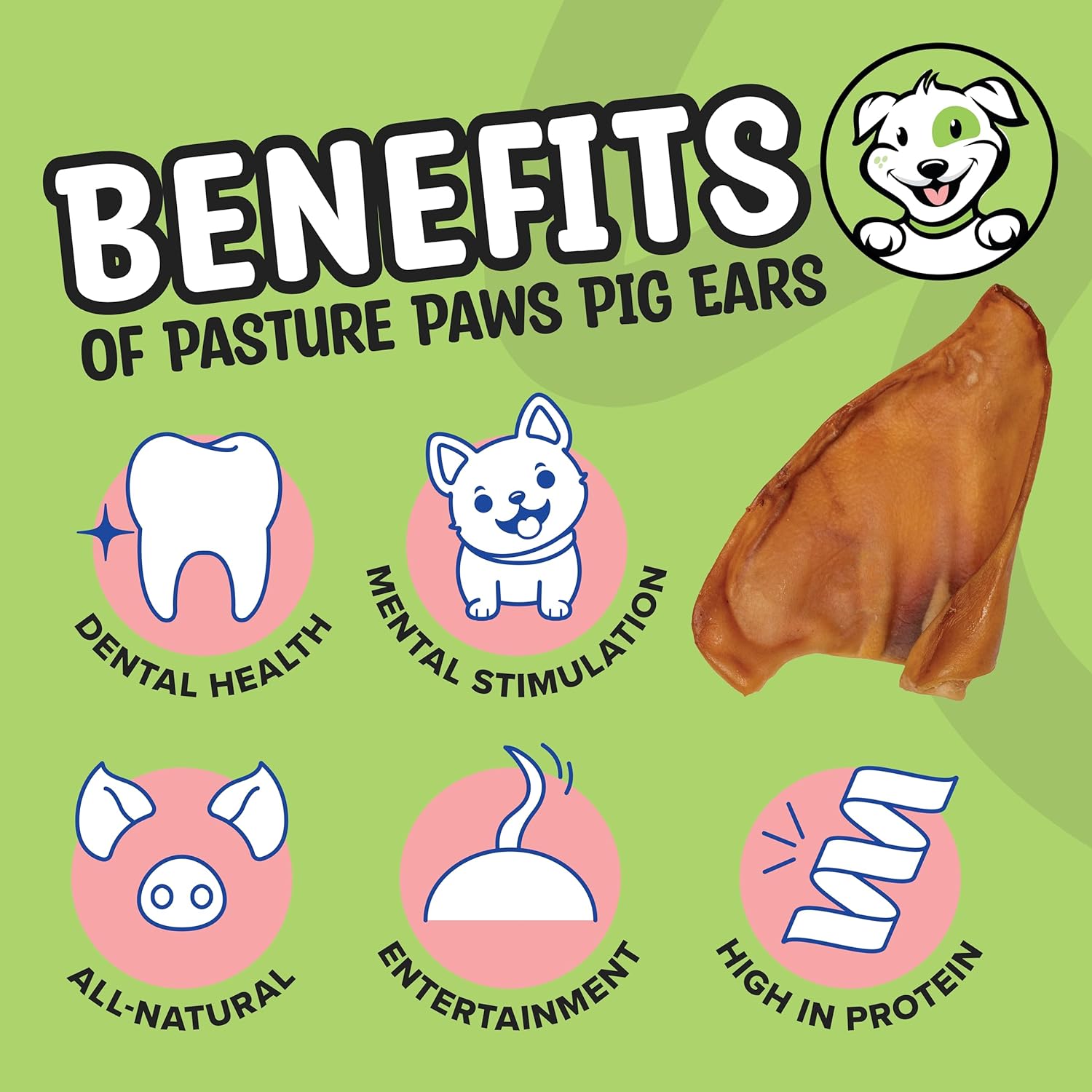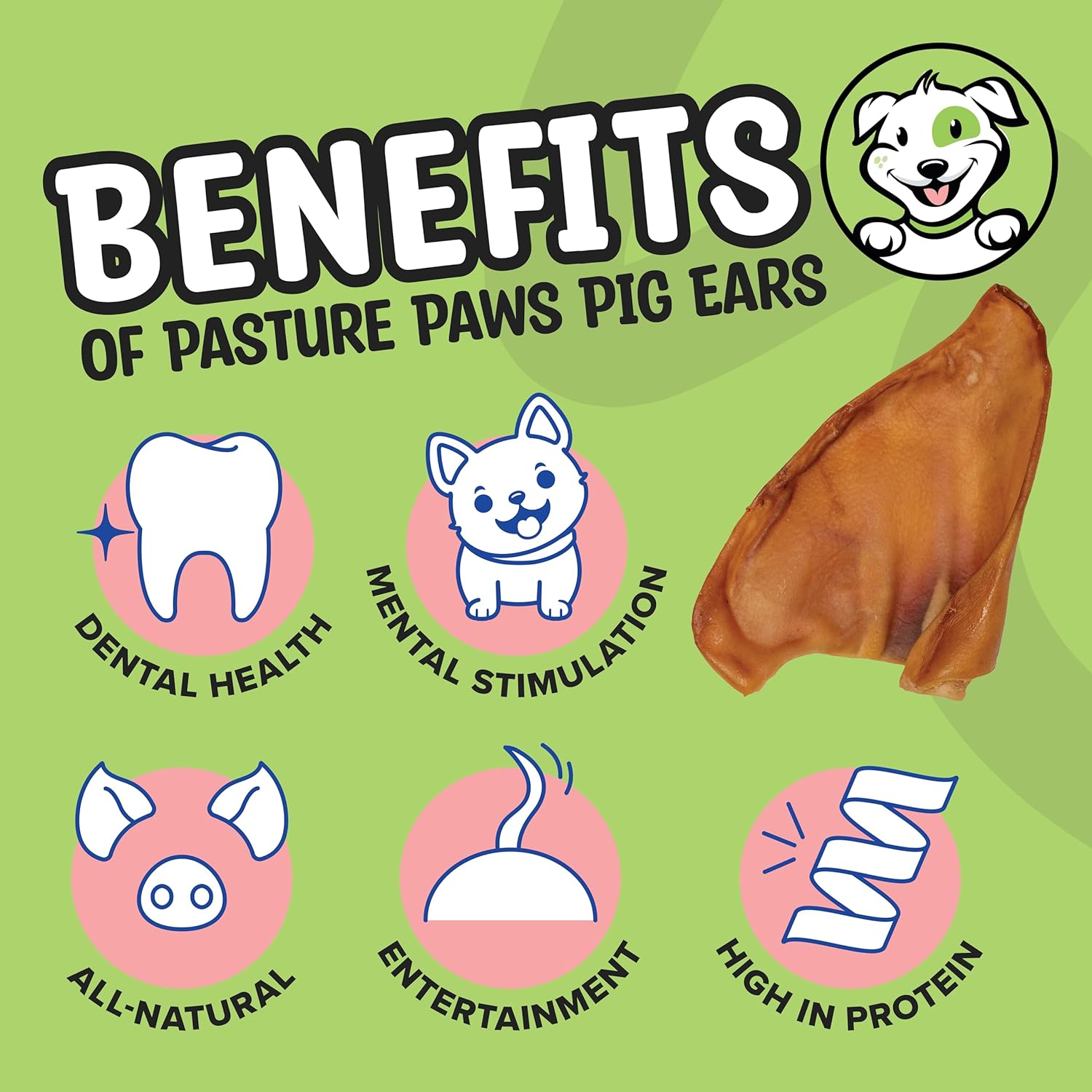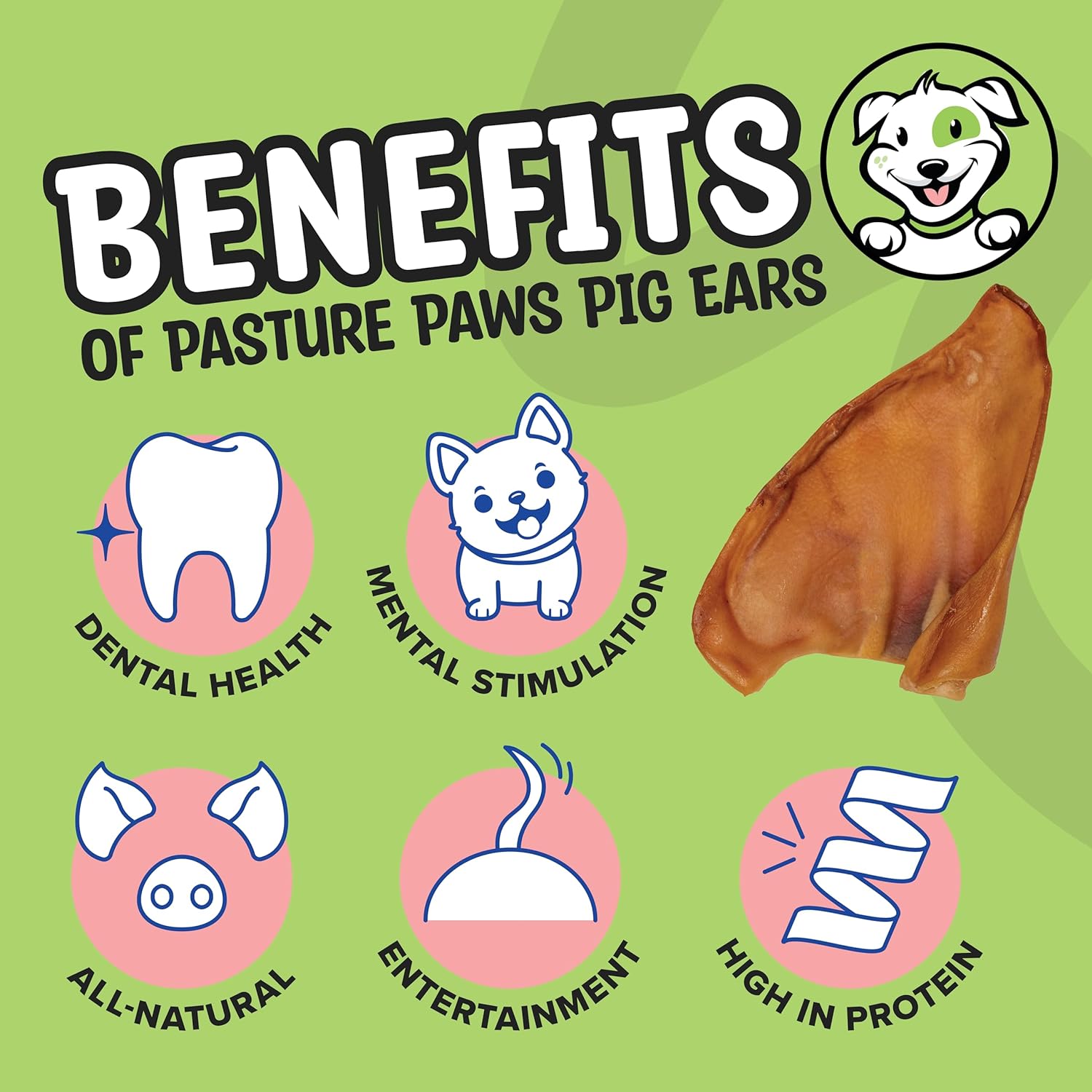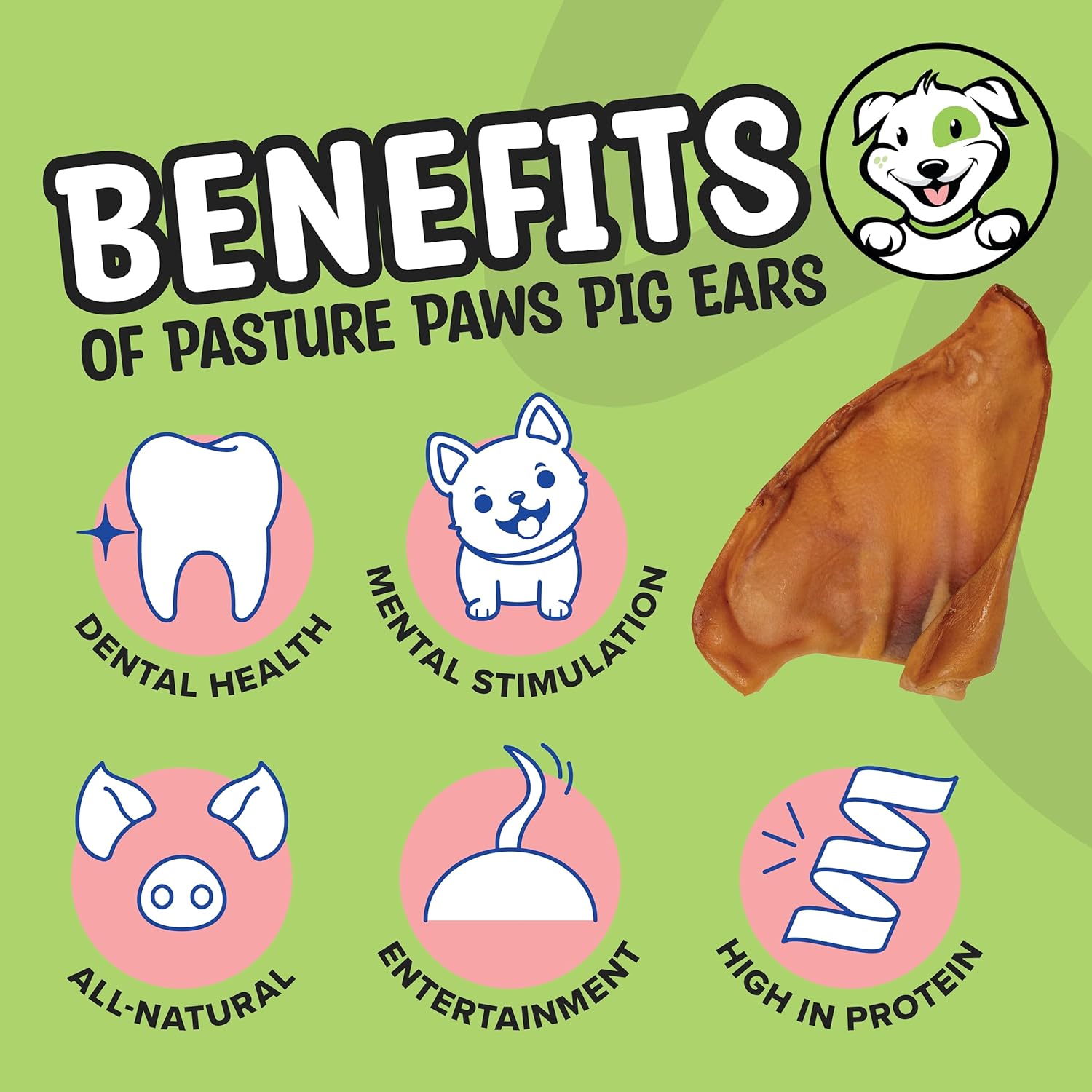Worried about finding a healthy and satisfying treat for your dog? Are pig ears good for dogs?
Yes, pig ears are a great treat for dogs. They are natural, highly digestible, and help maintain dental health by reducing plaque and tartar buildup. Additionally, pig ears are rich in protein and provide a satisfying chewing experience, making them an excellent choice for your furry friend.
Explore our selection of pig ears for dogs and pig ear dog treats to give your pet the best. Learn more about pig ears good for dogs and shop now at Pasture Paws. Read our comprehensive blog post to understand the pros, cons, and nutritional benefits of pig ears for dogs. Make an informed decision and ensure your furry friend enjoys taste and health.

If you're a dog owner, you may have heard about pig ears being a popular treat for dogs. While they can be a tasty snack for your furry friend, you may wonder if they are good for them.
Pig ears are a natural dog treat that can provide a satisfying chewing experience. They are high in protein and can help clean your dog's teeth by removing plaque and tartar.
However, it's important to note that pig ears can also have some drawbacks.
For example, they can be high in fat and calories, which can contribute to weight gain if given in excess.
Additionally, some pig ears may be contaminated with harmful bacteria, which can pose a risk to your dog's health.
Before giving your dog pig ears, it's important to consider their individual needs and health status.
If your dog has a history of digestive problems or is overweight, pig ears may not be the best choice for them.
It's also important to choose high-quality pig ears from a reputable source to minimize the risk of contamination.
By being informed about the potential benefits and risks of pig ears, you can make an informed decision about whether they are a good treat for your furry friend.
Understanding Pig Ears as Dog Treats
When it comes to choosing the right treat for your furry friend, it can be overwhelming to know what is safe and healthy. Pig ears have become a popular option for dog owners, but it is important to understand their nutritional profile and how they compare to other chew treats.
Nutritional Profile of Pig Ears
A single cooked pig ear contains approximately 29g of protein, 15g of fat, and 64g of water. They also contain various nutrients, such as iron, calcium, magnesium, and phosphorus.
However, it is important to note that the nutritional value can vary between manufacturers and cooking methods.
Pig ears are high in calories and fat, so they should be given in moderation and not to overweight dogs.
Additionally, pig ears have been linked to cases of Salmonella infection in humans, so it is important to handle them with care and ensure they are stored properly.
Pig Ears vs. Other Chew Treats
Pig ears are a natural chew treat option for dogs, but they are not the only option.
Rawhide chews are a popular alternative, but they can be a choking hazard and may contain harmful chemicals.
Other natural chews treat options include bully sticks, deer antlers, and yak chews.
When choosing a chew treat for your dog, it is important to consider their individual needs and preferences.
Some dogs may prefer a softer chew, while others may need a tougher option to help clean their teeth.
Benefits of Pig Ears for Dogs

If you're wondering whether pig ears are good for your furry friend, the answer is yes. Pig ears can provide several benefits for your dog's health and well-being. Here are some of the advantages of feeding your dog pig ears:
Dental Health Advantages
One of the main benefits of pig ears for dogs is their ability to promote dental health. Chewing on pig ears can help remove plaque and tartar buildup on your dog's teeth.
This is because the act of chewing stimulates saliva production, which helps to wash away harmful bacteria that can lead to dental issues.
Additionally, the texture of pig ears can help massage your dog's gums, promoting healthy blood flow and preventing gum disease.
Joint Health and Nutrition
Pig ears are also rich in nutrients that can benefit your dog's overall health.
They contain natural glucosamine and chondroitin, which are amino acids that help to support joint health and mobility.
These nutrients can be especially beneficial for older dogs or those with joint problems.
Pig ears are also a good source of vitamins and minerals, including calcium, which can help to strengthen bones and teeth.
In addition to their nutritional value, pig ears can also provide mental stimulation for your dog.
Chewing on pig ears can help relieve boredom and anxiety, providing a healthy outlet for your dog's natural chewing instincts.
Considerations When Giving Pig Ears
If you're considering giving your dog pig ears as a treat, there are some risks and precautions to keep in mind. While pig ears can be a tasty and natural treat for many dogs, it's important to be aware of potential health concerns.
Choking and Digestive Blockages
Pig ears can pose a choking hazard, especially for smaller dogs or those who like to gulp their food.
Additionally, if a dog eats too much of the ear at once, it can cause digestive blockages that may require surgery to remove.
To minimize the risk of choking or blockages, it's important to supervise your dog while they're eating pig ears and to give them small pieces at a time.
Caloric Content and Obesity
Pig ears are high in calories, which can contribute to weight gain and obesity if given too frequently or in large amounts.
If your dog is overweight or prone to weight gain, it's important to limit their pig ear intake or choose lower-calorie treats.
Bacterial Contamination Concerns
There is also a risk of bacterial contamination with pig ears.
Salmonella and other harmful bacteria can be present in pig ears, which can cause vomiting, diarrhea, and other health problems.
To minimize the risk of bacterial contamination, it's important to choose high-quality pig ears from reputable sources and to wash your hands after handling them.
Feeding Guidelines and Moderation for Pig Ears

When feeding your dog pig ears, moderation is key. While pig ears can be a healthy and enjoyable treat for your dog, it is important to keep in mind that they are high in calories and fat. Feeding your dog too many pig ears can lead to weight gain and other health problems.
Determining the Right Amount
The amount of pig ears you should feed your dog depends on their size and dietary needs.
As a general rule of thumb, larger dogs can handle more pig ears than smaller dogs.
It is also important to consider your dog's overall diet and to make sure that pig ears are not the primary source of their nutrition.
A good guideline is to feed your dog one pig ear per week as an occasional treat. If your dog is a teething puppy, you can offer pig ears more frequently to help soothe their gums.
However, always consult with your veterinarian to determine the appropriate feeding guidelines for your individual dog.
Supervision and Safe Practices
When feeding your dog pig ears, it is important to supervise them to ensure that they are chewing safely.
Some dogs may try to swallow large pieces of the pig ear, which can lead to choking or digestive issues.
To prevent this, make sure to give your dog appropriately sized pig ears and monitor them while they chew.
It is also important to choose high-quality pig ears that are free from additives and preservatives.
Look for pig ears that are sourced from reputable farms and processed in a safe and hygienic manner.
Important Factors for Pig Ear Feeding
When feeding pig ears to your furry friend, there are a few considerations to keep in mind, depending on your dog's specific needs. Here are some things to consider:
Puppies and Teething
If you have a puppy, you may be wondering if pig ears are a good choice for their teething needs. While pig ears can be a great chew toy for puppies, it's important to monitor their chewing to prevent choking hazards.
Additionally, puppies have sensitive digestive systems, so you need to introduce new foods slowly and in small amounts to avoid upsetting their stomachs.
Dogs with Allergies or Sensitivities
If your dog has food allergies or sensitivities, make sure to read the ingredients list carefully before giving them pig ears.
Some dogs may be allergic to pork, while others may have sensitivities to certain additives or preservatives.
If you're unsure, it's always best to consult with your vet before introducing any new foods to your dog's diet.
Senior Dogs and Dietary Restrictions
Senior dogs may have dietary restrictions due to health issues such as kidney disease or diabetes.
If your dog has dietary restrictions, make sure to choose pig ears that are low in fat and sodium.
Additionally, if your senior dog has dental issues, you may want to choose softer pig ears that are easier for them to chew.
Safe Handling and Preparation of Pig Ears
When feeding your dog pig ears, you also need to take certain precautions to ensure their safety. Here are some guidelines to follow for safe handling and preparation of pig ears.
Proper Storage and Handling
To prevent the growth of harmful bacteria, make sure to properly store and handle pig ears.
Keep them in a sealed container in the refrigerator or freezer until you're ready to give them to your dog.
Be sure to wash your hands thoroughly before and after handling pig ears, and avoid touching your face or any other surfaces while handling them.
Preparation Methods to Reduce Risks
You can use several preparation methods to reduce the risk of harmful bacteria in pig ears. Here are a few options:
- Blanching: Briefly blanching pig ears in boiling water can help kill bacteria on the surface. Be sure to let them cool completely before giving them to your dog.
- Boiling: Boiling pig ears in water for at least 10 minutes can also help kill bacteria. Again, let them cool completely before giving them to your dog.
- Irradiation: Some companies offer irradiated pig ears, which have been treated with low levels of radiation to kill bacteria. This method is not commonly used, but it may be an option if you're concerned about bacteria.
- Cleaning: You can also clean pig ears with a mild soap and water solution before giving them to your dog. Be sure to rinse them thoroughly and let them dry completely before serving.
Raw pork can contain harmful bacteria, so it's best to avoid giving your dog raw pig ears. Additionally, dehydration is not recommended as a method of preparation as it can cause the pig ears to become brittle and potentially dangerous for your dog to chew.
Alternatives to Pig Ears

If you're looking for alternatives to pig ears for your canine companions, there are plenty of options available. Here are a few healthier chew options and non-edible chew toys to consider:
Healthier Chew Options
Cow Ears
Cow ears are a popular alternative to pig ears. They are low in fat and high in protein, making them a great option for dogs who need to watch their weight. Cow ears are also a good source of glucosamine and chondroitin, which can help support joint health.
Bully Sticks
Bully sticks are made from high-protein beef muscle and are a safe and healthy alternative to pig ears. They are easy to digest and do not pose the same risk of bacterial contamination as pig ears. Bully sticks also provide a long-lasting chewing experience, which can help alleviate boredom and reduce destructive chewing behavior.
Dental Chews
Dental chews are specially designed to help clean your dog's teeth and freshen their breath. They come in a variety of flavors and textures, and some even contain added vitamins and minerals to support overall health.
Non-Edible Chew Toys
Rubber Toys
Rubber toys are a great option for dogs who love to chew. They come in a variety of shapes and sizes. Rubber toys can also be filled with treats to provide added stimulation.
These toys are also durable and can withstand even the most aggressive chewers.
Rope Toys
Rope toys are another popular option for dogs who love to chew. They are made from durable materials and can help promote healthy chewing habits. Rope toys also provide a fun and interactive way to play with your dog.
This can help alleviate boredom and reduce stress.
Conclusion
Pig ears can be a beneficial treat for dogs, offering nutritional benefits and dental health advantages. However, they should be given in moderation and with caution due to potential risks such as high fat content and bacterial contamination. Always choose high-quality pig ears from reputable sources and consult with a veterinarian to determine the best feeding guidelines for your individual dog.
Discover our carefully sourced pig ears and other healthy treats for your furry friend at Pasture Paws. Give your dog the best—shop now!
Frequently Asked Questions
Do vets recommend pig ears for dogs?
Vets generally have mixed opinions on pig ears for dogs. While pig ears can be a tasty and enjoyable treat for many dogs, some vets express concerns regarding potential choking hazards, digestive issues, and the risk of bacterial contamination. It is recommended to consult with your veterinarian before introducing pig ears into your dog’s diet to ensure they are a suitable treat for your specific pet.
Are pig ears safe for dogs to chew on?
Pig ears can be safe for dogs to chew on when given under supervision and in moderation. They are natural and typically easier to digest than some other chew treats. However, there are risks associated with pig ears, including the potential for choking, intestinal blockages, and bacterial contamination like Salmonella. Always monitor your dog while they are chewing and ensure you purchase pig ears from a reputable source that follows strict safety guidelines.
How often can you give dogs pig ears?
The frequency of giving pig ears to dogs should be limited to avoid potential health issues. It is best to treat pig ears as an occasional reward rather than a regular part of your dog’s diet. Once or twice a week is generally considered safe, but this can vary based on your dog's size, health, and overall diet. Consult with your veterinarian to determine an appropriate frequency for your pet.
Are pig ears better than rawhide?
Pig ears and rawhide each have their pros and cons. Pig ears are often more digestible and can be a natural source of enjoyment for dogs. In contrast, rawhide can be more durable and longer-lasting, but it poses a higher risk of causing blockages and other digestive issues. Pig ears may also have fewer additives compared to some rawhide products. Choosing between pig ears and rawhide will depend on your dog's chewing habits, health, and any specific recommendations from your veterinarian.
